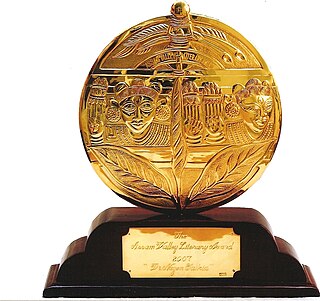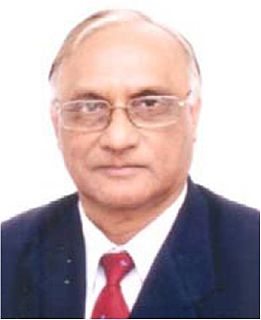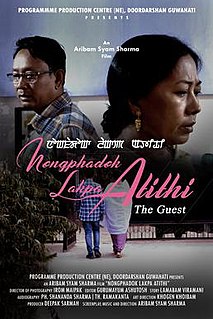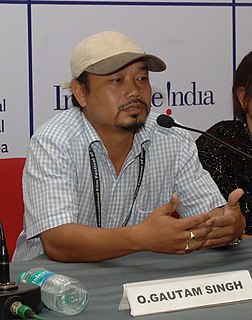Related Research Articles

The Institute for Plasma Research (IPR) is an autonomous physics research institute located in India. The institute is involved in research in aspects of plasma science including basic plasma physics, research on magnetically confined hot plasmas and plasma technologies for industrial applications. It is a large and leading plasma physics organization in India. The institute is mainly funded by Department of Atomic Energy. IPR is playing major scientific and technical role in Indian partnership in the international fusion energy initiative ITER. It is part of the IndiGO consortium for research on Gravitational Waves.

Baruah, also; Barua, Barooah, Baruwa, Baroova, Barooa, Baroowa, Borooah, Boruah, Baroa is a very common Assamese surname.

Titabor is a town in the Jorhat district of Assam in India. It is about 20 km away from Jorhat City. It is one of the highly greeny places of Assam almost surrounded by different tea-states.

Assamese cinema, also known as Jollywood, is the cinema industry in the Assamese language, watched primarily in Assam, India. The industry was born in 1935 when Jyoti Prasad Agarwala released his movie Joymoti. Since then the Assamese cinema has developed a slow-paced, sensitive style, especially with the movies of Bhabendra Nath Saikia and Jahnu Barua. The industry is called Jollywood, named for Agarwala's Jyoti Chitraban Film Studio.

The Assam Valley Literary Award was conceived in the year 1990 by Williamson Magor Education Trust to honour creative writers who have enhanced Assamese literature.

Nabakanta Barua was a prominent Assamese novelist and poet. He was also known as Ekhud Kokaideu. As Sima Dutta he wrote many poems in his early life.

The Kamal Kumari National Award is an Indian Award given to individuals and groups in India for outstanding contribution to Art, Culture & Literature and Science & Technology. It was instituted by the Kamal Kumari Foundation in 1990 in memory of Kamal Kumari Barooah, the remarkable matriarch of the Khongiya Barooah family of Thengal, Assam. The foundation has till date a number of awardees. The first award was given to Sobha Brahma in 1991 in the category of Culture. The award carries a cash award of Rs.200,000, a trophy and a citation.
The Kamal Kumari Foundation is a charitable trust in Assam established in 1990 by noted Indian entrepreneur, tea planter and philanthropist Hemendra Prasad Barooah in the fond memory of his mother Kamal Kumari Barooah, the remarkable matriarch of the Khongiya Barooah family of Thengal, Assam. It has been able to achieve acclaim and is renowned in the entire North eastern region of India for its charitable and constructive activities.

Siva Prasad Barooah (1880–1938) was a renowned planter, philanthropist, politician, and humanist from Assam. He was the pioneer or path-breaker in Assamese journalism who published Batori, the first daily newspaper in Assam. The Siva Prasad Barooah National Award, instituted in his fond memory, is being given to individual or group, by The Kamal Kumari Foundation since 1999, for outstanding contributions to the field of journalism. He belongs to the famous Khongiya Barooah family of Thengal, the family that emerged as the champion of Assamese interests and repository of Assamese Culture and traditions. He was the richest tea-planter at that time in India. He married Kamal Kumari Barooah in 1917 and noted Indian entrepreneur, tea planter and philanthropist Hemendra Prasad Barooah was his son.

Kamal Kumari Barooah (1899–1978) was the matriarch of the Khongiya Barooah family of Thengal, Assam. She was born to Mahendranath Mahanta and Swarnalata Mahanta at Borelengi Satra. In 1917, she married Siva Prasad Barooah of Khongiya Barooah family, the family that emerged as the champion of Assamese interests and repository of Assamese culture and traditions. Noted Indian entrepreneur, tea planter and philanthropist Hemendra Prasad Barooah was her son.

Ramesh C. Deka is an Ear, Nose and Throat (ENT) specialist and the former Director of All India Institute of Medical Sciences, New Delhi, which is globally recognised as the premier medical institute of India. He is one of the pioneers of cochlear implant surgery in India and performed the country's first bilateral cochlear implantation surgery.
Achyut Lahkar was the father of the Bhryamyman or Mobile theatre and gave birth to mobile theatre in Assam in the 1960s. He founded the popular Natraj Theatre at Pathsala in 1963 which performed across Assam and in other states for nearly 40 years. He was a pioneering dramatist, actor, director and producer and staged numerous memorable plays on the mobile theatre stage. He also published and edited an illustrated magazine called Deepawali for some time. He was awarded the Kamal Kumari National Award in 1997.
Hemendra Prasad Barooah (1926-2013), was an Indian entrepreneur, tea planter and philanthropist known for his contributions to Assam tea and tourism industries. He was honoured by the Government of India, in 2013, that bestowed on him the Padma Shri, the fourth highest civilian award, for his contributions to the fields of trade and industry.
Patricia Mukhim is an Indian social activist, writer, journalist and the editor of Shillong Times, known for her social activism. A recipient of honours such as Chameli Devi Jain award, ONE India award, Federation of Indian Chambers of Commerce and Industry FLO award, Upendra Nath Brahma Soldier of Humanity award, Siva Prasad Barooah National award and North East Excellence award, she was honored by the Government of India, in 2000, with the fourth highest Indian civilian award of Padma Shri.

The Cinema of Manipur is the film industry based in Manipur, India. It does not only include the Meitei language movies, but covers all the films made by the people from different communities residing in Manipur. The Manipuri film industry was born when Matamgi Manipur was released on 9 April 1972.

Nongphadok Lakpa Atithi is a 2019 Manipuri film directed by Aribam Syam Sharma and produced by Deepak Sarmah. It stars Ningthoujam Rina and Lairenjam Olen in the lead roles. The film was premiered at the 3rd Guwahati International Film Festival 2019 as the Opening Film of the Indian section. It is based on Lamabam Viramani's short story Atithi. It was written as a radio play by M. K. Binodini Devi under the title Nongphadok Lakpada. The adapted screenplay of the film was done by Aribam Syam Sharma. The film won four awards at the 13th Manipur State Film Festival 2020.

Saaphabee is a 1976 Manipuri film written by Sarangthem Bormani, produced by G. Narayan Sharma and directed by Aribam Syam Sharma. The film features Kangabam Tomba and Subadani in the lead roles. It was released at Usha Cinema, Paona Bazar on 13 July 1976. The movie won the National Film Award for Best Feature Film in Manipuri at the 24th National Film Awards. It is based on the famous Manipuri folk play Haorang Leishang Saaphabee. It is the first Manipuri folk film.

Oinam Gautam Singh is an Indian film director and editor who works in Manipuri films. He started his career in Manipuri cinema as an editor and later took up direction since more than a decade. One of the successful filmmakers in Manipuri Cinema, he is the recipient of many awards, including a National Film Award for his 2011 movie Phijigee Mani. Gautam has worked under eminent film personalities like Aribam Syam Sharma and Oken Amakcham. He had been a Jury Member of Indian Panorama for 45th International Film Festival of India (IFFI) 2014.

Manipuri Pony is a 2013 non-feature Manipuri film scripted by Aribam Gautam and directed by Aribam Syam Sharma. It is produced by Films Division of India. The film won the National Film Award for Best Exploration / Adventure Film at the 60th National Film Awards. The movie was also selected in the Indian Panorama of the 44th International Film Festival of India 2013 and the Mumbai International Film Festival in 2014.
References
- 1 2 3 "Syam Sharma selected for Kamal Kumari Award : 21st apr09 ~ E-Pao! Headlines". www.e-pao.net. Hueiyen News Service (Manipur Information Centre). 20 April 2009. Retrieved 3 June 2021.CS1 maint: others (link)
- ↑ Staff Reporter (15 September 2010). "Kamal Kumari awards function today". Assam Tribune. Retrieved 3 June 2021.
- ↑ Talukdar, Sushanta (25 November 2012). "M.S. Prabhakara receives Siva Prasad Barooah Award". The Hindu. ISSN 0971-751X . Retrieved 3 June 2021.